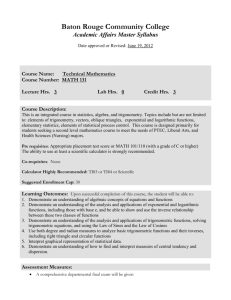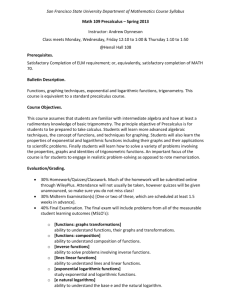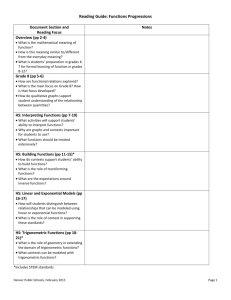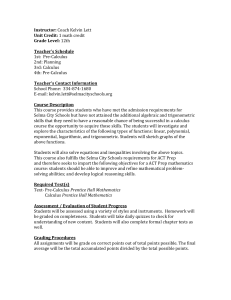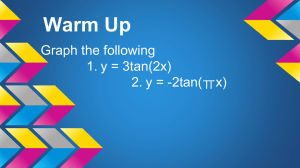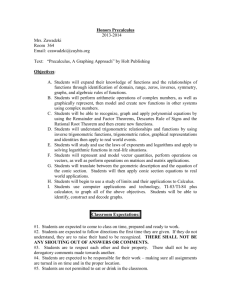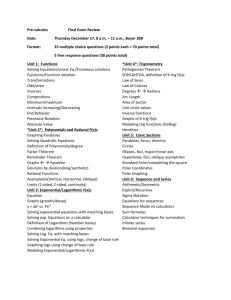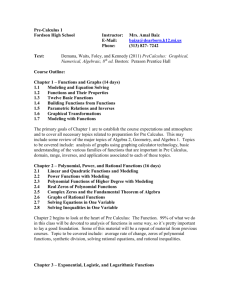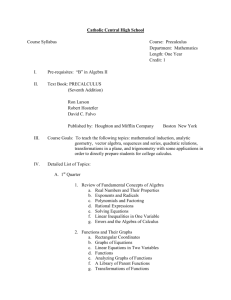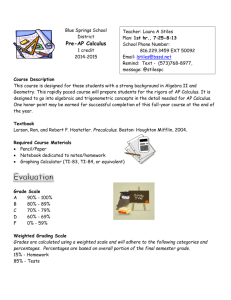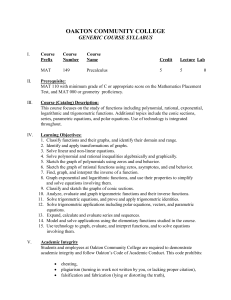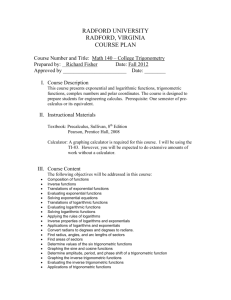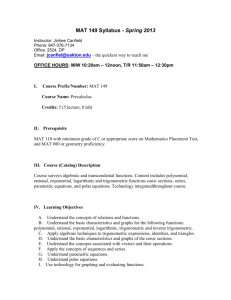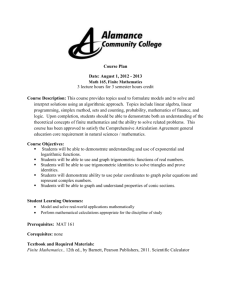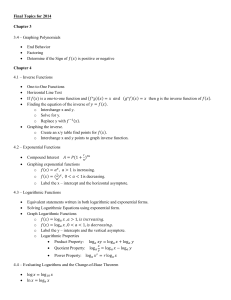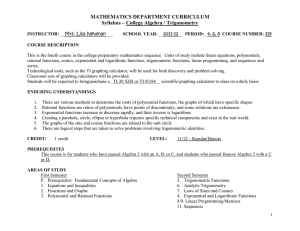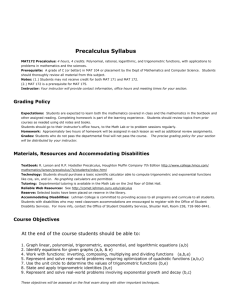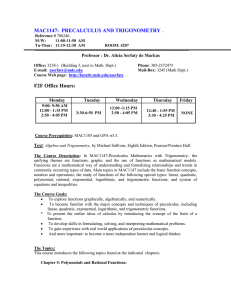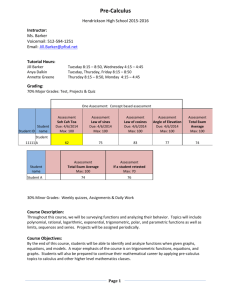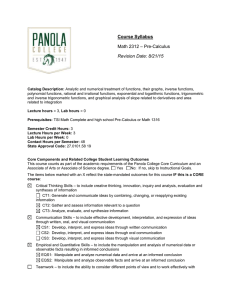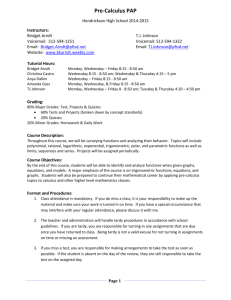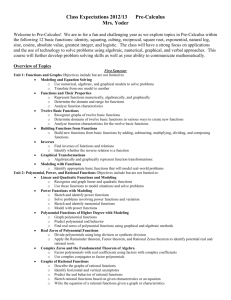MATH_120_MS - Baton Rouge Community College
advertisement
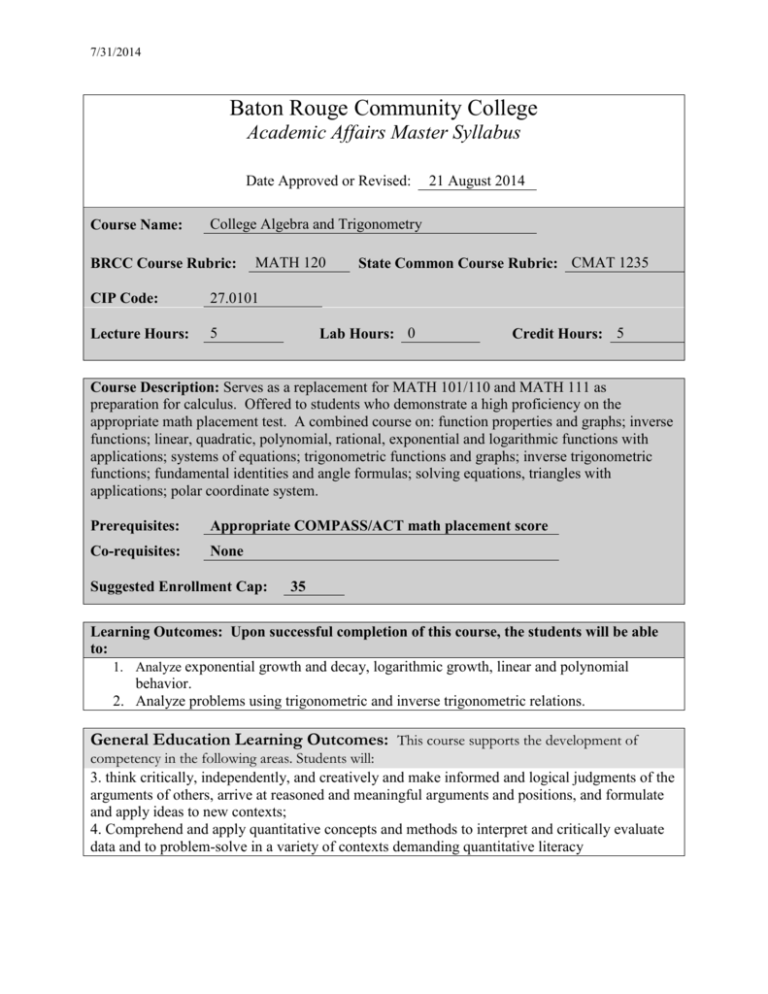
7/31/2014 Baton Rouge Community College Academic Affairs Master Syllabus Date Approved or Revised: Course Name: 21 August 2014 College Algebra and Trigonometry BRCC Course Rubric: MATH 120 CIP Code: 27.0101 Lecture Hours: 5 State Common Course Rubric: CMAT 1235 Lab Hours: 0 Credit Hours: 5 Course Description: Serves as a replacement for MATH 101/110 and MATH 111 as preparation for calculus. Offered to students who demonstrate a high proficiency on the appropriate math placement test. A combined course on: function properties and graphs; inverse functions; linear, quadratic, polynomial, rational, exponential and logarithmic functions with applications; systems of equations; trigonometric functions and graphs; inverse trigonometric functions; fundamental identities and angle formulas; solving equations, triangles with applications; polar coordinate system. Prerequisites: Appropriate COMPASS/ACT math placement score Co-requisites: None Suggested Enrollment Cap: 35 Learning Outcomes: Upon successful completion of this course, the students will be able to: 1. Analyze exponential growth and decay, logarithmic growth, linear and polynomial behavior. 2. Analyze problems using trigonometric and inverse trigonometric relations. General Education Learning Outcomes: This course supports the development of competency in the following areas. Students will: 3. think critically, independently, and creatively and make informed and logical judgments of the arguments of others, arrive at reasoned and meaningful arguments and positions, and formulate and apply ideas to new contexts; 4. Comprehend and apply quantitative concepts and methods to interpret and critically evaluate data and to problem-solve in a variety of contexts demanding quantitative literacy Assessment Measures: Assessment of all learning outcomes will be measured using the following methods: 1. Instructor created exams and or homework 2. A comprehensive, departmental-designed final exam Information to be included on the Instructor’s Course Syllabi: Disability Statement: Baton Rouge Community College seeks to meet the needs of its students in many ways. See the Office of Disability Services to receive suggestions for disability statements that should be included in each syllabus. Grading: The College grading policy should be included in the course syllabus. Any special practices should also go here. This should include the instructor’s and/or the department’s policy for make-up work. For example in a speech course, “Speeches not given on due date will receive no grade higher than a sixty” or “Make-up work will not be accepted after the last day of class.” Attendance Policy: Include the overall attendance policy of the college. Instructors may want to add additional information in individual syllabi to meet the needs of their courses. General Policies: Instructors’ policy on the use of things such as beepers and cell phones and/or hand held programmable calculators should be covered in this section. Cheating and Plagiarism: This must be included in all syllabi and should include the penalties for incidents in a given class. Students should have a clear idea of what constitutes cheating in a given course. Safety Concerns: In some programs this may be a major issue. For example, “No student will be allowed in the safety lab without safety glasses.” General statements such as, “Items that may be harmful to one’s self or others should not be brought to class.” Library/ Learning Resources: Since the development of the total person is part of our mission, assignments in the library and/or the Learning Resources Center should be included to assist students in enhancing skills and in using resources. Students should be encouraged to use the library for reading enjoyment as part of lifelong learning. Expanded Course Outline: I. Functions and Their Graphs A. Rectangular Coordinates B. Graphing Equations C. Linear Equations in Two Variables D. Functions E. Analyzing Graphs of Functions F. Transformations of Functions G. Combinations of Functions H. Composite Functions I. Inverse Functions J. Systems of Linear Equations 2 II. Polynomial and Rational Functions A. Quadratic Functions and Applications B. Polynomial Functions and Applications C. Polynomials and Synthetic Division D. Complex Numbers E. Zeros of Polynomial Functions F. Rational Functions G. Nonlinear Inequalities III. Exponential and Logarithmic Functions A. Exponential Functions and Their Graphs B. Logarithmic Functions and Their Graphs C. Properties of Logarithms D. Exponential and Logarithmic Equations E. Applications Involving Exponential and Logarithmic Functions IV. Trigonometry A. Measuring Angles in Radians and Degrees B. Defining the Trigonometric Functions C. Right Triangle Trigonometry D. Graphing Variations of the Six Basic Trigonometric Functions E. Inverse Trigonometric Functions F. Applications Involving Right Triangles V. VI. Analytic Trigonometry A. Using and Verifying Trigonometric Identities B. Solving Trigonometric Equations C. Using Sum and Difference Formulas D. Using Multiple Angles Formulas E. Using Product-to-Sum Formulas (optional) Additional Topics in Trigonometry A. Law of Sines B. Law of Cosines C. Geometric Vectors and Vectors on the Coordinate Plane D. Algebra of Vectors and the Dot Product E. Complex Numbers in Trigonometric Form (optional) F. Polar Coordinates G. Graphing Polar Equations 3
